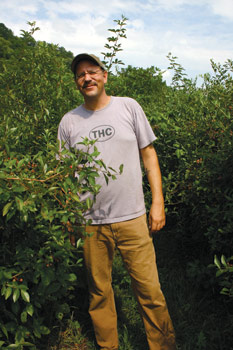When I met Brian Sonofkus at his Burnsville farm, the tune from a popular TV show stuck in my head: "Green acres is the place for me …" The nine-acre farm rests on creek-side bottomland that's been farmed for decades. It's dead flat, which always merits special mention for Western North Carolina property. There were long rows of tomatoes near the end of their season but still ripening on the vine. There were patches of corn and squash, raised beds of herbs and lettuce, a line of 'Rainbow' Swiss chard, and a big greenhouse covered in white plastic.

The misty, late-morning scene made me expect Sonofkus to be wearing overalls and singing.
Instead, the tall chef was hunched over, creeping down a long row of baby blueberry bushes. His dogs, Jax and Eva, ran over to greet me while he finished nestling the saplings into evenly spaced holes cut into landscape fabric. Past the greenhouse, I spied rows and rows of tall blueberry bushes.
"Jax likes blueberries," said Sonofkus of the tail-wagging, pit-bull mix. The old farm, he explains, had about 1,000 bushes when he bought it a few years ago. There was even a stand of grapes and an irrigation system. But the blueberry patch was so overgrown, the rows were barely distinguishable. So Sonofkus and his landscaper dad took the advice of an agriculture-extension agent and mowed down many of the mature bushes in order to save the rest. The patch is down to about 350 bushes, he estimates.
We sample a few berries, sweet and so dark blue they're almost black. Sonofkus reaches the upper branches with such ease, I joke that he'd be welcome on any blueberry-picking mission. He raises an eyebrow, and the man once known for his absurdly long Fu Manchu mustache says, deadpan, "It's my dream to be the blueberry king in these parts!"
In any case, the grapes tend to fall off the vine before ripening, and the wooden arbors are collapsing, Sonofkus continues. "At first, I thought I would do something like make my own grape soda, but then I realized how much work is involved," he says. That's been one of the persistent lessons on the farm: Don't bite off more than you can chew.
The land was once part of a 200-acre farm, and, hoping to create a small-scale, organic farm, Sonofkus bought nine acres during a little hiatus from the restaurant. His passion for cooking persistently infuses most everything he does on the place. He describes his style of cooking as "a Southern hodgepodge, from Low Country to High, Creole to Cajun, [but with] a Latin flare." One aspect of such a blend means making fresh salsas, and that means Sonofkus definitely grows tomatoes, peppers and herbs.
"You start getting into salsas with three different colors of tomatoes," says Sonofkus, explaining how he loves experimenting with flavors and colors. His first season, he "went a little crazy" and grew every variety of tomato that enticed his imagination and taste buds. He still likes the jazzy look and bright flavor of 'Green Zebra' tomatoes. But he quickly figured out, "It's better to grow less, and do it right."
This year, he stuck with such salsa favorites as "Oxheart," a tomato shaped as it names implies. "It stays kind of pink inside, a little green on top," says Sinofkus.
He also prefers to make fresh, homemade pickles, so he grows cucumbers, perking them up with hot peppers.
Tupelo also features edible flowers in its eclectic menu, and though Sonofkus grows quite a few on the farm, he learned that "bugs love snapdragons." He laughs and points out, "You put [a flower] on a hot plate, and bugs decide to walk out, that's not good!"
Another experiment, incidentally, was an attempt to recreate his mother's homemade chili sauce, which he describes as being "like something for sloppy joes." But alas, his restaurant customers never warmed up to the family recipe, says Sonofkus, who mentions cooking roots traced back to his Polish grandmother and Christmases spent making pierogies with his dad.
"I've always been in the kitchen, I've always loved cooking," says Sonofkus, who says his classic-French training naturally lends well to Cajun and Creole cuisines. And pairing a restaurant with a family farm "naturally follows suit," though it has its limits.
For instance, the handful of chickens living in his greenhouse couldn't possibly supply the 300 dozen eggs a week the busy downtown establishment needs. Fortunately, there are a lot more local sources for such quantities than there used to be, he notes. And the eggshells — tossed in with other restaurant scraps — help fuel his compost pile. "Last year, that pile grew the sweetist batch of kale."
Margaret Williams can be reached at mvwilliams@mountainx.com or 251-1333, ext. 152.



Had a very nice meal at Tupelo Honey last night after I caught a lecture at the Black Mountain College Museum. Brian Sonofkus is doing a wonderful thing by reconnecting the restaurant directly to the small farm. He sets a great example.